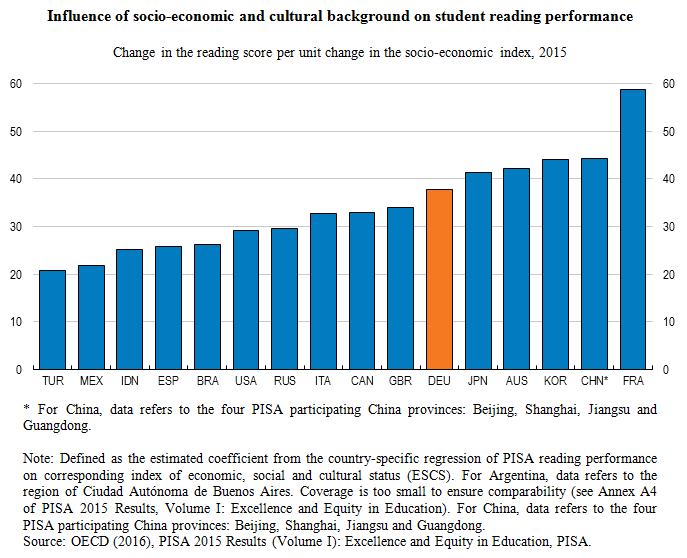Productivité et croissance à long terme
Going for Growth 2018 - Germany note
Going for Growth is the OECD flagship report analysing structural policy settings and economic performance to provide policymakers with concrete reform recommendations to boost growth and ensure that the gains are shared by all. The 2018 Interim Report reviews the main growth challenges and takes stock of reforms enacted over the past year -- in both advanced and emerging economies -- on policy priorities identified in the previous issue of Going for Growth.
Country highlights
In recent years, German GDP per capita has remained close to the average of advanced OECD countries. Unemployment is low and the labour market participation rate is among the highest in the OECD. Income inequality has increased in recent years but remains lower than OECD average. Reducing inequality in the access and quality of education, however, remains a policy priority. Educational outcomes and student success in the labour market continue to be closely linked to their socio-economic background. Other challenges including reducing policy-related obstacles to full-time work of women and facilitating early access to employment for refugees and migrants. Moreover, Germany has a low productivity level in services relative to manufacturing and reducing regulatory barriers to competition and innovation in network industries as well as professional services and crafts remains a key priority.
Going for Growth 2017 recommendations include:
- Improve equity in education and boost outcomes by reducing early tracking system, providing more financial resources to schools with a higher share of pupils with a weak socio-economic background, and enabling access to tertiary education from vocational programmes through enhanced training opportunities.
- Encourage full-time labour force participation for women by expanding early childcare programmes and places, removing tax distortions of joint taxation for couples with similar earning levels and improving the quality of early childhood education.
- Enhance labour market access and integration of refugees and migrants by assessing and recognising their qualifications and skills and through increased provision of training, where needed, to unlock the potential of migration for inclusive development.
- Reduce tax wedges on labour income and shift taxation towards less distortive taxes by lowering social security contributions, especially for low-pay workers, updating property tax valuations, expanding the taxation of pollution emissions and phasing out tax expenditures for environmentally harmful activities.
- Lower regulatory barriers to competition, especially in services sectors by abolishing price regulations and reducing exclusive rights in professional services and some crafts.
Recent policy actions in these areas include:
- Increased financial support to universities has been allocated to improve access to higher education for students from vocational education pathways. To mitigate some challenges of an increasingly technology-rich environment, measures to improve the school-to-work transition and life-long learning opportunities have also been expanded.
- Reforms to reduce the gender gap in labour market participation and encourage women to work in full-time jobs have been implemented. An additional EUR 1.1 billion has been granted from 2017 to 2020 to expand the coverage of early childcare programmes and places.
- To facilitate early labour market integration of asylum seekers and refugees, labour market access conditions for asylum seekers to small-scale paid employment have been relaxed and an initiative started to enable 10 000 young refugees to commence training in the skilled crafts sector.
Germany: Latest Economic Forecast
Documents connexes
